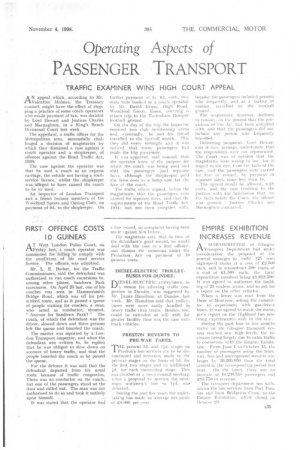Operating Aspects of
Page 53

If you've noticed an error in this article please click here to report it so we can fix it.
PASSENGER TRANSPORT
TRAFFIC EXAMINER WINS HIGH COURT APPEAL
AN appeal wilieh, according to-Mr. Valentine Holmes, the Treasury counsel, might have the effect of stop-. ping a practice of some coach operators who evade payment of tax, was decided by Lord Hewart and Justices Charles and Macnaghten, ItT a King's Bench Divisional Court last week.
The appellant, a traffic officer for the Metropolitan area, successfully challenged a decision of magistrates by which they dismissed a case against a coaeli operator and a shopkeeper; of offences against the Road Traffic Act, 1930.
The case against the operator was that he used a coach as an express carriage, the vehicle not haying a roadservice 'licence, whilst the shopkeeper was: alleged to have caused the coach to he so :used.
An inspector of London Transport and a, friend became members of the WoOdford Sports,and. Quting Club, P11 paymentof bd. to tlihshopkeeper. On
further payment of Is. Gd. each, two seats were hooked in a coach" operated by Mr. David Evans, High Road, Woodford Green, Essex, covering a return trip ,to the Tottenham Hotspur football ground.
OU the day of the trip the inspector received. two club membership cards and, eventually, he and his friend travelled to the football match. This they did every fortnight and it was noticed that many passengers had made the trip previously.
It was apparent, said counsel, that the operator knew of the purpose [or which the coach was being used and that the passengers paid separate fares, although the shopkeeper paid the fares over in a lump sum for the hire of the coach, 'llte traffic officer argued, before the -magistrates, that the passengers were carried for separate fares, and that the requirements of the Road Trairic Act, 19:34,• had not been complied with. because the' passengersincluded persons who frequentlyi and as a matter of routine, travelled to the football ground The magistrates, however, declined to ConViet, on the ground that the provisions. of the Act had been complied with, and that the passengers did not include any person who frequently travelled.
lklivering jtuigment, T.ord Ilewart said it was, perhaps, unfortunate that the respondents were not represented. TheCourt was of opinion that the magistrates were wrong in law, for it leaped to the eye, from the facts of the case, that the passengers were carried for hire or reward, by payment of separate fares, none less than is.
The appeal would he allowed, with costs, and the case remitted to .the justices with the intimation that, an the facts het-ore the Court, the offence was proved. justices (Marks and Macnaghten concurred.




















































































